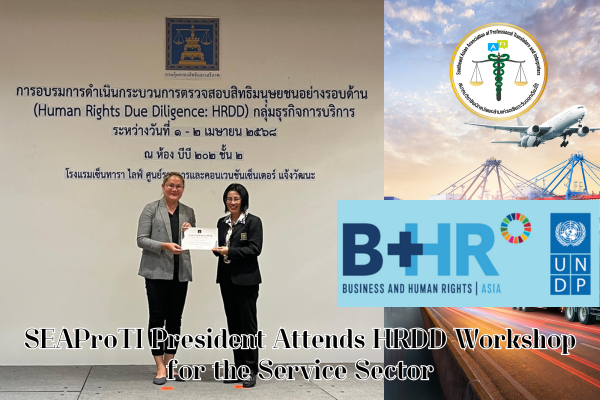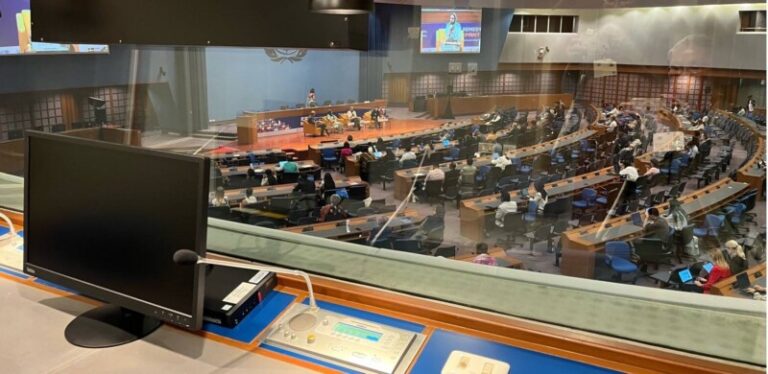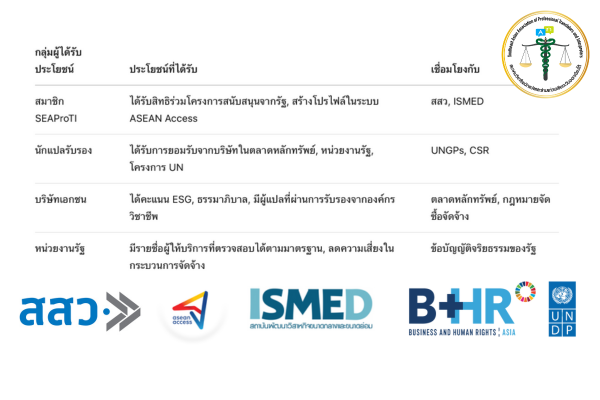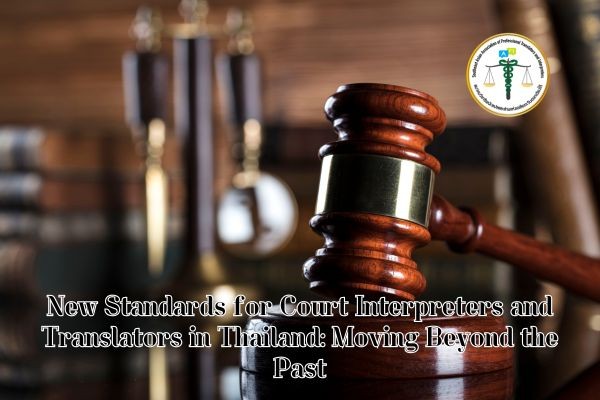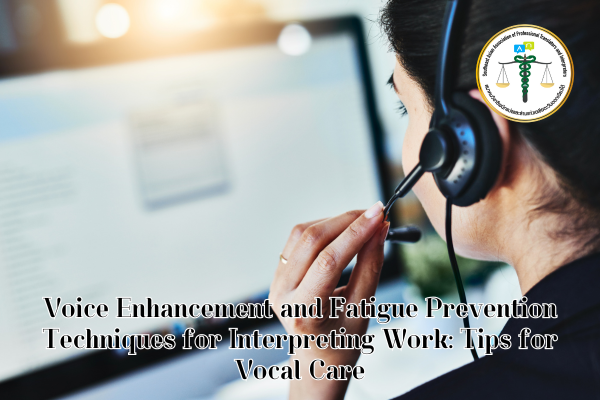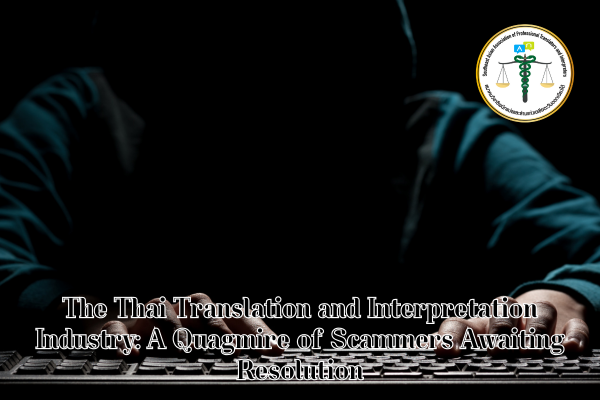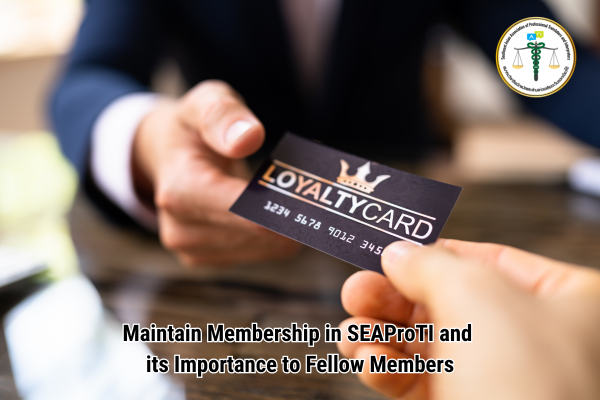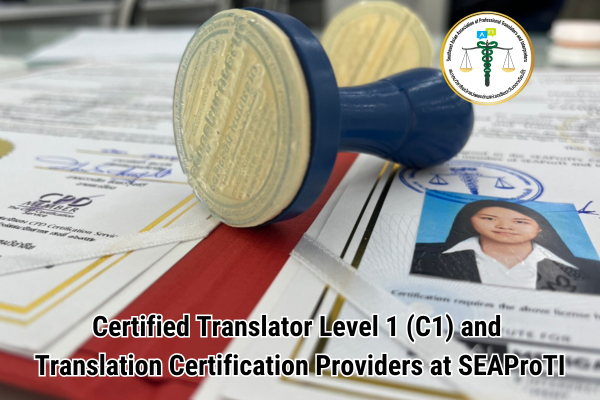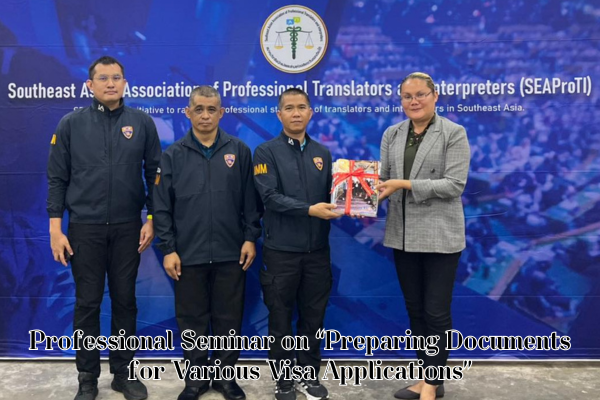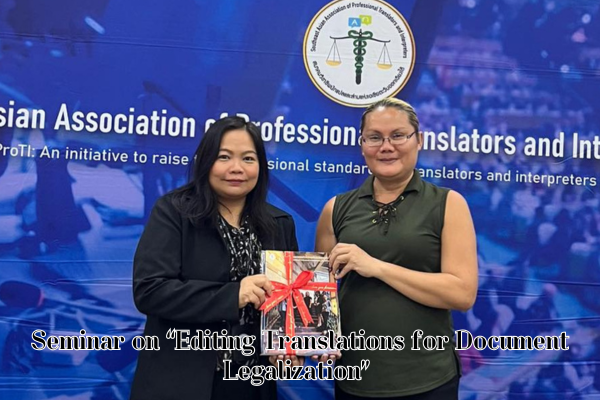Promoting Human Rights Through Language: SEAProTI President Attends Human Rights Due Diligence (HRDD) Workshop for the Service Sector
Strengthening HRDD Understanding and Highlighting the Role of Language Professionals in Advancing Human Rights Across Supply Chains
Bangkok, April 1–2, 2025 – Wanitcha Sumanat, President of the Southeast Asian Association of Professional Translators and Interpreters (SEAProTI), participated in a practical workshop titled “Human Rights Due Diligence (HRDD)”, held at Room BB 202, 2nd Floor, Centara Life Government Complex Hotel & Convention Centre, Chaeng Watthana, Bangkok. The training aimed to support businesses in the service sector in understanding and implementing HRDD principles in a concrete and sustainable manner.
HRDD: A Key Business Tool in the 21st Century
The two-day workshop introduced the HRDD process as a vital tool for businesses to assess and manage risks related to human rights. Participants were guided through international frameworks, real-world case studies, and practical implementation strategies, with a focus on how companies can promote respect for human rights throughout their operations and supply chains.
The service sector—which includes language, communication, and other forms of human-centric services—plays a significant role in shaping ethical business practices. The training highlighted the importance of systematically managing human rights risks and proactively addressing potential impacts across organizational levels.
Translators and Interpreters: Bridging Human Rights and Equitable Access to Information
Representing SEAProTI, Wanitcha Sumanat shared key insights on the unique and often overlooked role of translators and interpreters in the human rights ecosystem. In cross-linguistic and cross-cultural contexts, access to accurate, timely, and comprehensible information is not just a matter of efficiency—it is a matter of equity and justice.
“Respect for human dignity begins with listening, understanding, and conveying information faithfully. Translators and interpreters ensure that stories are not lost or distorted in translation,”
said Wanitcha Sumanat during a group discussion session.
She also emphasized SEAProTI’s commitment to developing ethical and human-rights-aligned professional practices. These include interpreter training in vulnerable contexts (such as with refugees, victims of trafficking, and individuals with communication disabilities), as well as advocating for the inclusion of language professionals in public policy and human rights dialogues.
SEAProTI’s Social Mission: Integrating Human Rights into Professional Development
SEAProTI’s participation in this HRDD workshop reflects the Association’s broader mission of embedding human rights principles into professional practice. As part of its long-term vision, SEAProTI supports the United Nations Guiding Principles on Business and Human Rights and aligns its work with the Sustainable Development Goals (SDGs), especially in areas such as gender equality, quality education, and access to justice.
The Association aims to contribute to a more ethical service sector by fostering standards of practice that respect human dignity, amplify marginalized voices, and promote accountability in multilingual and multicultural settings.
Conclusion: Language Professionals as Modern-Day Human Rights Advocates
While translators and interpreters often work behind the scenes, their impact on equitable communication in diverse societies is profound. In today’s globalized world, language professionals serve as the bridge between silence and voice, misunderstanding and clarity, exclusion and inclusion.
SEAProTI’s active engagement in HRDD capacity building is a powerful reminder that language is not only a tool for connection—but also a vehicle for justice. By empowering language professionals to understand and promote human rights, the Association reaffirms its role as a driver of positive change and inclusive development.
SEAProTI’s certified translators, translation certification providers, and certified interpreters:
The Southeast Asian Association of Professional Translators and Interpreters (SEAProTI) has officially announced the criteria and qualifications for individuals to register as “Certified Translators,” “Translation Certification Providers,” and “Certified Interpreters” under the association’s regulations. These guidelines are detailed in Sections 9 and 10 of the Royal Thai Government Gazette, issued by the Secretariat of the Cabinet under the Office of the Prime Minister of the Kingdom of Thailand, dated July 25, 2024, Volume 141, Part 66 Ng, Page 100.
To read the full publication, visit: the Royal Thai Government Gazette
ส่งเสริมสิทธิมนุษยชนผ่านการสื่อสาร: นายกสมาคม SEAProTI เข้าร่วมอบรม Human Rights Due Diligence (HRDD) ในภาคธุรกิจบริการ
สร้างความเข้าใจใน HRDD และบทบาทของนักภาษาในการขับเคลื่อนสิทธิมนุษยชนในห่วงโซ่อุปทาน
กรุงเทพมหานคร, 1–2 เมษายน 2568 – คุณวณิชชา สุมานัส นายกสมาคมวิชาชีพนักแปลและล่ามแห่งเอเชียตะวันออกเฉียงใต้ (SEAProTI) เข้าร่วมการอบรมเชิงปฏิบัติการในหัวข้อ “การดำเนินกระบวนการตรวจสอบสิทธิมนุษยชนอย่างรอบด้าน (Human Rights Due Diligence: HRDD)” ซึ่งจัดขึ้น ณ ห้องประชุม บีบ 202 ชั้น 2 โรงแรมเซ็นทารา ไลฟ์ ศูนย์ราชการและคอนเวนชันเซนเตอร์ แจ้งวัฒนะ กรุงเทพมหานคร เพื่อส่งเสริมให้ภาคธุรกิจบริการตระหนักและมีแนวทางที่ชัดเจนในการดำเนินงานโดยคำนึงถึงหลักสิทธิมนุษยชน
HRDD: เครื่องมือสำคัญของภาคธุรกิจในศตวรรษที่ 21
การอบรมครั้งนี้จัดขึ้นเพื่อสร้างความเข้าใจในกระบวนการ HRDD ซึ่งเป็นกระบวนการที่องค์กรธุรกิจสามารถใช้ประเมินและบริหารความเสี่ยงที่อาจเกิดขึ้นต่อสิทธิมนุษยชน ทั้งในระดับภายในองค์กรและตลอดทั้งห่วงโซ่อุปทาน โดยมีเนื้อหาครอบคลุมทั้งหลักการสากล แนวทางการนำไปปฏิบัติจริง และกรณีศึกษาจากหลากหลายอุตสาหกรรม
ภาคธุรกิจบริการ ซึ่งรวมถึงสื่อสาร ภาษา และแรงงานด้านบริการอื่น ๆ มีบทบาทสำคัญในการส่งเสริมการเคารพสิทธิมนุษยชนอย่างเป็นรูปธรรม การอบรมครั้งนี้จึงมุ่งเน้นให้ผู้เข้าร่วมสามารถประเมินผลกระทบที่อาจเกิดขึ้นจากการดำเนินกิจกรรมทางธุรกิจ และจัดทำแนวทางการจัดการความเสี่ยงอย่างยั่งยืน
นักแปลและล่าม: ผู้เชื่อมโยงสิทธิมนุษยชนกับการเข้าถึงข้อมูลอย่างเท่าเทียม
ในการอบรมครั้งนี้ คุณวณิชชา สุมานัส ได้ร่วมแลกเปลี่ยนมุมมองในฐานะตัวแทนจากสมาคม SEAProTI โดยชี้ให้เห็นว่า นักแปลและล่ามมีบทบาทสำคัญในการขับเคลื่อนสิทธิมนุษยชน โดยเฉพาะอย่างยิ่งในบริบทของการสื่อสารข้ามภาษา ซึ่งมีผลโดยตรงต่อ “การเข้าถึงข้อมูล” และ “ความเข้าใจที่ถูกต้อง” ของประชาชน ผู้เสียหาย และผู้มีส่วนได้ส่วนเสียทุกระดับ
“การเคารพศักดิ์ศรีความเป็นมนุษย์เริ่มต้นจากการฟัง เข้าใจ และถ่ายทอดอย่างถูกต้อง นักแปลและล่ามคือผู้ที่ช่วยให้เรื่องราวถูกส่งต่ออย่างไม่บิดเบือน”
– คุณวณิชชา สุมานัส กล่าวระหว่างการอภิปรายกลุ่ม
คุณวณิชชายังได้กล่าวถึงแนวทางของสมาคมฯ ที่มุ่งพัฒนาแนวปฏิบัติทางวิชาชีพที่สอดคล้องกับหลักการสิทธิมนุษยชน เช่น การฝึกอบรมเชิงจริยธรรม การสนับสนุนล่ามในบริบทเปราะบาง เช่น ผู้ลี้ภัย เหยื่อการค้ามนุษย์ และผู้พิการทางการสื่อสาร ตลอดจนการส่งเสริมให้เกิดการมีส่วนร่วมของผู้ให้บริการภาษาในกระบวนการนโยบายสาธารณะ
SEAProTI กับภารกิจเพื่อสังคม: บูรณาการสิทธิมนุษยชนสู่การพัฒนาที่ยั่งยืน
การเข้าร่วมอบรม HRDD ครั้งนี้สะท้อนถึงความตั้งใจของสมาคม SEAProTI ในการเป็นส่วนหนึ่งของภาคธุรกิจบริการที่ขับเคลื่อนด้วยจริยธรรม และพร้อมปรับตัวเพื่อรับมือกับความท้าทายด้านสิทธิมนุษยชนที่เกิดขึ้นในโลกปัจจุบัน
สมาคมฯ ได้วางเป้าหมายระยะยาวในการยกระดับมาตรฐานวิชาชีพให้สอดคล้องกับหลักการชี้นำของสหประชาชาติว่าด้วยธุรกิจกับสิทธิมนุษยชน (UN Guiding Principles on Business and Human Rights) พร้อมทั้งสนับสนุนเป้าหมายการพัฒนาที่ยั่งยืน (SDGs) โดยเฉพาะประเด็นด้านความเสมอภาค การศึกษาที่มีคุณภาพ และความยุติธรรมทางสังคม
บทสรุป: นักภาษากับบทบาทผู้พิทักษ์สิทธิมนุษยชนยุคใหม่
แม้บทบาทของนักแปลและล่ามอาจถูกมองว่าอยู่เบื้องหลังการสื่อสาร แต่ในโลกปัจจุบันที่เต็มไปด้วยความหลากหลายทางภาษาและวัฒนธรรม คนกลุ่มนี้กลับมีอิทธิพลต่อการส่งต่อความเข้าใจอย่างมีคุณภาพ และเป็นด่านหน้าในการปกป้องสิทธิมนุษยชนในพื้นที่ที่เปราะบางที่สุด
การมีส่วนร่วมของ SEAProTI ในกิจกรรม HRDD ครั้งนี้คือเครื่องยืนยันว่า วิชาชีพนักภาษาไม่ได้เป็นเพียงผู้ถ่ายทอดคำพูด หากแต่เป็น “ผู้ขับเคลื่อนการเปลี่ยนแปลง” ที่มุ่งมั่นจะทำให้เสียงของทุกคนได้ถูกยิน ได้รับความเข้าใจ และได้รับความเคารพอย่างเท่าเทียม
เกี่ยวกับนักแปลรับรอง ผู้รับรองการแปล และล่ามรับรองของสมาคมวิชาชีพนักแปลและล่ามแห่งเอเชียตะวันออกเฉียงใต้
สมาคมวิชาชีพนักแปลและล่ามแห่งเอเชียตะวันออกเฉียงใต้ (SEAProTI) ได้ประกาศหลักเกณฑ์และคุณสมบัติผู้ที่ขึ้นทะเบียนเป็น “นักแปลรับรอง (Certified Translators) และผู้รับรองการแปล (Translation Certification Providers) และล่ามรับรอง (Certified Interpreters)” ของสมาคม หมวดที่ 9 และหมวดที่ 10 ในราชกิจจานุเบกษา ของสำนักเลขาธิการคณะรัฐมนตรี ในสำนักนายกรัฐมนตรี แห่งราชอาณาจักรไทย ลงวันที่ 25 ก.ค. 2567 เล่มที่ 141 ตอนที่ 66 ง หน้า 100 อ่านฉบับเต็มได้ที่: นักแปลรับรอง ผู้รับรองการแปล และล่ามรับรอง


